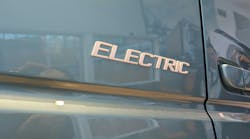The news about the U.S. Environmental Protection Agency’s Cleaner Truck Initiative probably raised a few eyebrows. In mid-November, the agency announced that it is launching a rulemaking to further cut the emissions of nitrogen oxide (NOx) from diesel-powered heavy-duty trucks. The agency is planning to publish a proposed NOx rule early in 2020.
Heavy-duty diesel emissions, of which NOx is one, have been reduced by a factor of 10 during the last 15 years. Given that reduction and the fact that recent emissions discussions have focused more and more on CO2 may have led many in the trucking industry to think that NOx had been driven down as low as it needed to be.
At the National League of Cities Summit in Los Angeles, NACFE’s engineering director Yunsu Park was on a panel that discussed the clean air challenges some cities are facing. Unfortunately, there are still parts of the country that will not be able to meet their long-term air quality goals with current regulations. This will have a negative health effect for many of the people living in those non-attainment areas.
Inevitably efficiency and emissions are linked. We all remember the mid-2000s emissions reductions efforts through heavy exhaust gas recirculation and diesel particulate filters. How could we forget the negative impact on fuel efficiency not to mention the reliability issues?
The good news is that since then we have seen an increase in fuel efficiency as truck makers implemented selective catalytic reduction, and a whole host of other technologies were developed to boost fuel economy while meeting today’s emissions rules.
We don’t know which technologies will help the industry meet tomorrow’s low NOx rules and what bumps we may face in implementing them, but NACFE will continue to focus on efficiency in goods movement. If history is any indication one way or another the trucking industry will make things work. However, it would be great if regulators, technology providers and the companies and drivers who will be paying for and using the technology could all work together to make sure the implementation of any new standards goes smoothly.
I doubt it will happen seamlessly, but NACFE is a strong believer in open collaboration and we’re happy to help in any way we can.



